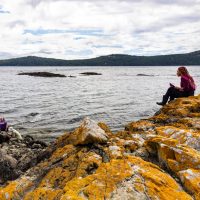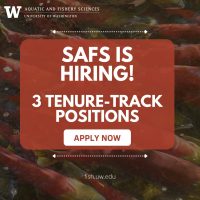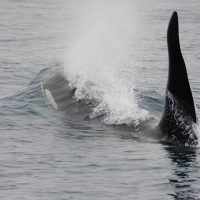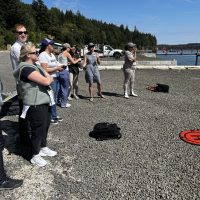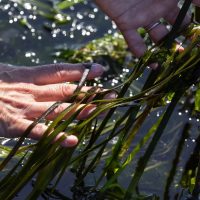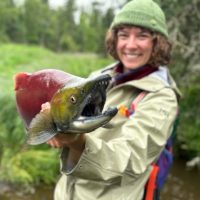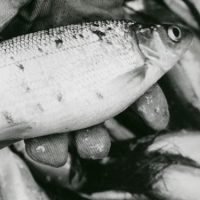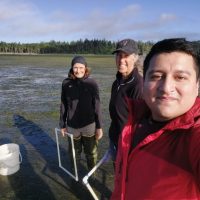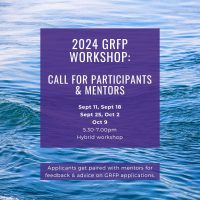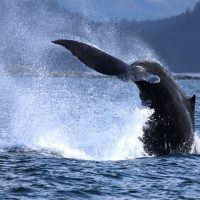Filter Results
Students get their hands dirty studying marine biology on Yellow Island, led by SAFS graduate student
Chris Mantegna, a third-year graduate student at SAFS, has spent the past three summers mentoring undergrads on on Yellow Island, a pristine 11-acre nature preserve in Washington’s San Juan Islands.
Read moreThree faculty job ads now live!
SAFS is hiring for three tenure-track faculty jobs: Assistant Professor Freshwater Ecology, Assistant or Associate Professor in Pacific Salmon ecology, evolution, & management, and Associate or Full Professor in Applied Organismal Biology & Aquaculture and Executive Director of the Western Regional Aquaculture Center. Apply now!
Read moreWhat’s for dinner? Scientists unearth key clues to cuisine of resident killer whales
A team led by researchers at the University of Washington and the National Oceanic and Atmospheric Administration has uncovered key information about what resident killer whale populations are eating. Researchers had long known that resident killer whales prefer to hunt fish, particularly salmon. But some populations thrive, while others have struggled.
Read morePutting on a show: SAFS drone program demonstrates research for congressional staff
On August 16, congressional staff from the State of Washington gathered for a drone demonstration, led by the Marine Landscape and Ecology Lab (MLEL), based at the University of Washington School of Aquatic and Fishery Sciences.
Read moreUW researchers discover eelgrass superpower in Puget Sound
Eelgrass meadows are among the most productive and ecologically important places in Puget Sound. Already highly valued as nurseries for sea life, researchers including SAFS Affiliate Faculty, Drew Harvell, have discovered a new eelgrass superpower, as living urban systems that reduce human pathogens in seafood by as much as 65%.
Read moreThe return of the sockeye: a summer with the Alaska Salmon Program
You may be familiar with the Alaska Salmon Program and its critical role in producing knowledge for managing and conserving regional ecosystems and their fisheries. But we’re doing a deeper dive into the role of students in the program, the opportunities for immersive learning, and the bonding experience with both fellow students and instructors during their time in Alaska.
Read moreThe globalization of the aquatic food trade
In an increasingly globalized world, aquatic foods have followed the same trend. Seafood is one of the most highly traded foods in the world and is a critical resource for human nutrition, livelihoods, and revenue. But despite this globalization trend, researchers have revealed that the basic characteristics of aquatic food trade remain largely unknown.
Read moreHow do our sea-meadows grow?
The WSG-funded research informs the future of eelgrass restoration in Washington, and the study is headed by UW Professors Kerry Naish (SAFS) and Jennifer Ruesink (Biology), as well as SAFS doctoral student Bryan Briones Ortiz. Their research first looked at the baseline genetic structure of the eelgrass population in Washington.
Read moreCall for mentors and participants in GRFP workshop
Call for participants and mentors for the 2024 GRFP workshop. The National Science Foundation’s Graduate Research Fellowship Program (GRFP) offers 3 years of support for graduate students, and hybrid workshops will be held during September and October to pair participants with mentors to offer guidance and advice for the application.
Read moreRapid increase rates in large whale populations continue until they near carrying capacity
In a new study challenging conventional thinking about how populations of large baleen whales recover from whaling, researchers have revealed that populations continue increasing rapidly for a wide range of recovery levels, only slowing once approaching pre-whaling levels.
Read more